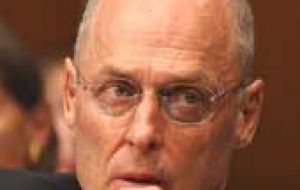MercoPress. South Atlantic News Agency
Paulson: risk re-pricing “inevitable”, but no recession
 Paulson confident that markets will absorb the losses
Paulson confident that markets will absorb the losses United States Treasury Secretary Henry Paulson said the current turmoil in financial markets will slow economic growth but should not spark a recession, according to a report published Thursday in The Wall Street Journal.
Paulson said that the turmoil "will extract a penalty on the growth rate" of the U.S. economy, but that "the economy and the markets are strong enough to absorb the losses" without triggering a recession. The former CEO of Goldman Sachs added that some funds or businesses may go under as the markets adjust, but that he expects the U.S. economy to keep growing. Paulson underlined that the financial markets turmoil is happening "against a backdrop of a very healthy global economy with strong fundamentals". "Looking over periods of stress that I've seen, this is the strongest global economy we've had", he said adding that the "adjustment" in financial markets is likely to continue but he emphasized that he expects the U.S. economy to keep growing. According to The Wall Street Journal during the hour long interview, Mr. Paulson spoke slowly, picking his words with care and described the widespread reluctance to make loans to more risky home buyers and firms and to hold securities backed by such loans as a "reassessment or re-pricing of risk", something that "shouldn't surprise anyone" and termed the situation as "inevitable". "When you have periods of benign markets, particularly in situations where parts of markets and the economy are growing at levels that are unsustainable, market participants aren't going to be as vigilant as they should be," he said. Paulson also pointed to the current strength of the global economy, which is one major difference between this crisis and the one it most closely resembles -- the 1998 episode in which Russia's debt default and currency devaluation and the implosion of hedge fund Long Term Capital Management led credit markets to seize up. Although the U.S. economy has slowed, the International Monetary Fund recently projected that the world economy will grow at a better than 5% rate this year and next after three years of unusually strong growth. Other big differences between 2007 and 1998, Mr. Paulson said, are the global integration of economies and markets over the past decade and the large increase in the number and size of hedge funds and other private pools of capital. He said that, beyond the steps already taken to encourage more transparency among hedge funds and the like, the ability of the Bush administration to react constructively is limited. It has largely relied on the Federal Reserve and other central banks to fight the financial fire by pumping large amounts of liquidity into parched money markets. "There is nothing, in my judgment that we should be doing in terms of guaranteeing market participants against losses or in terms of restraining risk taking" Mr. Paulson said. "One of the natural consequences of the excesses is that some entities will cease to exist." However in the interview Paulson hesitated to specify areas where his Department and regulators will focus in coming months as they draw lessons from recent weeks. "Clearly, there really needs to be a focus on mortgages and how the product is originated and sold," he said. A major source of today's problems was deterioration of the standards used to issue mortgages, particularly in the sub-prime market, and the ripple effects when delinquency rates on those loans began to rise. Paulson wouldn't specifically respond to a question about the role of credit-rating companies, which have been widely criticized for their favorable evaluations of some mortgage-backed securities, but cited a need for "better understanding" of increasingly complex financial instruments. The Wall Street Journal underlines that Paulson's Wall Street background stands in contrast to the previous two Bush administration Treasury secretaries, who had been chief executives of industrial companies. "After taking office in July 2006, he initiated scenario-planning exercises, some in cooperation with his British counterpart, to prepare for market turmoil and ordered up communications protocols for various eventualities. He also reopened the Treasury's market-monitoring room ("war room"), which had been shuttered to save money by his immediate predecessor, John Snow, a former railroad executive and economist". In August 2006, at an annual gathering of Mr. Bush and his economic advisers at the presidential retreat at Camp David in Maryland, Mr. Paulson outlined "the possibility of turbulence in markets and the reassessment of risk." This year's session was held at the Treasury Department last Wednesday, just before markets tanked. Since then, Mr. Paulson said, he has talked frequently by phone with Fed Chairman Ben Bernanke and other members of the President's Working Group on Financial Markets, Wall Street executives he knows from his past career and a couple of his counterparts in other countries, concludes the interview with David Wessel. .




Top Comments
Disclaimer & comment rulesCommenting for this story is now closed.
If you have a Facebook account, become a fan and comment on our Facebook Page!